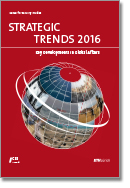Strategic Trends 2016

Key Developments in Global Affairs
Author(s): Daniel Keohane, Lisa Watanabe, Prem Mahadevan, Oliver Thränert, Severin Fischer
Editor(s): Oliver Thränert, Martin Zapfe
Series Editor(s): Andreas Wenger
Series: Strategic Trends
Publisher(s): Center for Security Studies (CSS), ETH Zurich
Publication Year: 2016
Publication Place: Zurich
